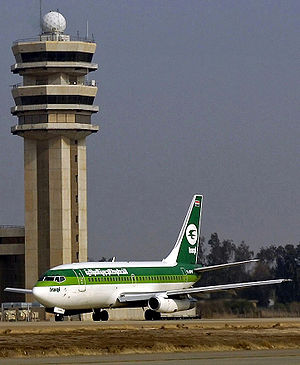An Iraqi army officer boarded a flight full of deported asylum seekers at Baghdad airport and ordered British immigration officials not to send anyone back by force again, according to a refugee organisation that monitors expulsions.
The confrontation occurred yesterday when the first British deportation flight to Baghdad touched down carrying almost 40 Iraqis.
The officer, reportedly flanked by seven guards bearing Kalashnikovs, asked the refused asylum seekers whether they wanted to return and, according to the International Federation of Iraqi Refugees (IFIR), declared: "Those of you who want to come back, you get off, the rest of you stay where you are."
Passengers who stayed on the plane, now back in Britain and being held in Brook House immigration detention centre, told the IFIR that "the [Iraqi officer told the] UK immigration officers to go away and not try to send people back by force again".
The plane initially flew to Italy and the passengers were put on another flight. "About three people refused to move plane and they were beaten by security guards. They've got injuries from that," the IFIR claimed. "There were 130 security guards on the plane. Why did they need so many? There were even some arguments between the British and Italian securities."
The United Nations high commissioner for refugees (UNHCR) condemned the forcible removal of failed asylum seekers to Baghdad. The UK's shift in immigration policy was in clear breach of the UN body's guidelines on safe repatriation.
Ten of the 39 Iraqi detainees put on the charter flight at Stansted airport yesterday morning were offloaded in Baghdad. The remainder returned to the UK at 4.30am today.
Lin Homer, chief executive of the UK Border Agency, said: "We are establishing a new route to southern Iraq and have successfully returned 10 Iraqis to the Baghdad area. This is an important first step for us. We are working closely with the Iraq government to iron out the issues which led to some of the returnees being sent back, and expect to carry out another flight in the future.
"Having an enforced route for returns is an important part of our overall approach; however, the government prefers the majority of returnees to leave voluntarily. In the past three years more than 2,500 people have chosen to return to Iraq under the assisted voluntary return programme."
Until now the government has been returning failed asylum seekers only to the Kurdish region of northern Iraq, which has been peaceful and relatively free of the suicide bombings that have disrupted other parts of the country.
The UNHCR opposes the return of Iraqis to the central region of the country because of the danger to civilians. Both Sweden and Denmark have, however, begun sending failed asylum seekers back to Baghdad.
A spokesman for the London office of the UNHCR said: "We had meetings with the government [on Wednesday] and highlighted our concerns about returning people to the central governorates of Iraq. Our position is that returns to central Iraq are premature. They could send the wrong signal to other countries, like Syria and Jordan, which have large numbers of refugees and could trigger a destabilising wave of returns."
The International Federation of Iraqi Refugees (IFIR), which monitors deportations, said it had spoken to one of the deported asylum seekers. He told the organisation: "We couldn't move on the flight there were so many security. Even the food was expired. They forced 10 of us to get off in Baghdad.
"They said the British embassy would help us but they just gave us $100 and left us. I'm too scared to go to where I used to live. Everything they told us is a lie."
Sandy Buchan, the chief executive of Refugee Action, said: "If Baghdad is now deemed to be safe then where on earth is deemed dangerous? The Foreign Office itself has stated that even peaceful and non-political aid agencies like the Red Cross are not safe from attack.
"We believe that people who come from areas where there is widespread violence or human rights abuses should be granted temporary humanitarian protection until the situation in their country changes."
According to Home Office figures, 632 people were forcibly deported to the Kurdish region in the north between 2005 and 2008. The IFIR estimates that the total now stands at approximately 900. There have been monthly charter flights carrying about 50 people each since the beginning of 2009.
"As recently as 11 October three car bombs exploded in the western Iraqi city of Ramadi and killed 19 people," said an IFIR spokesman. "Violence and bloodshed continue in Iraq, which saw 1,891 civilian deaths in the first six months of this year. There are also widespread food shortages and lack of access to clean drinking water in many areas."
Those being deported are sometimes handcuffed to accompanying security guards. There have been complaints of excessive force being used to manhandle detainees aboard.


![Reblog this post [with Zemanta]](http://img.zemanta.com/reblog_e.png?x-id=a26d9bcb-ffa6-4a28-899b-1a18a0c46cb0)






 Join our page
Join our page


0 comments:
Post a Comment